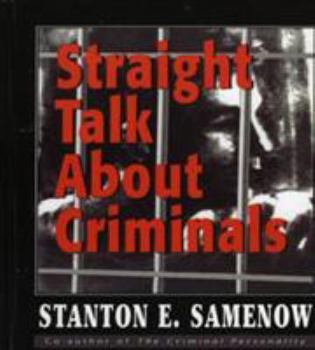Straight Talk about Criminals: Understanding and Treating Antisocial Individuals
Select Format
Select Condition 
Book Overview
Is there a genetic predisposition to crime? Should mental illness be taken into account? Do family and social environments have a role? Do people become abusers because they have been abused? How can people who do terrible things consider themselves good people? What should someone involved in a relationship with a criminal know? Stanton Samenow, co-author of the widely respected three-volume study of The Criminal Personality, has collected the questions...
Format:Hardcover
Language:English
ISBN:1568218753
ISBN13:9781568218755
Release Date:May 1997
Publisher:Jason Aronson
Length:325 Pages
Weight:0.05 lbs.
Dimensions:1.2" x 6.2" x 9.4"
Customer Reviews
3 ratings
Book review
Published by Thriftbooks.com User , 15 years ago
Very informative book. It goes well with "Inside the criminal mind," also by Stanton Samenow.
GOOD JOB BUT REDUNDENT
Published by Thriftbooks.com User , 15 years ago
Based on his 35 years of experience evaluating the psychology of criminals, Stanton Samenow has come to the belief that criminals are not made by external elements such as their environment, the way they were treated by their parents, peer pressure, etc. Criminals are formed because, for reasons so far not disclosed by him, early on in life, like at ages 2-5, criminals got in the habit of, and comfortable with, making choices to act as antisocial self-centered predators. The first 250 pages of his book is laid out in the format of answering questions posed to him during lectures he has given primarily to forensic psychologists. Based on their questions, these social worker seem to have the belief that criminals are formed by factors external to themselves. In response to almost all their questions he basically answers that they are wrong, and that the cause of the criminal behavior is, as stated above, is based solely on their habits of making antisocial self-centered decisions when confronted with almost any situation. To prove his point, he follows up on his statement that these social workers are wrong with examples and statistics from his own experience. For example, in answer to their implication that parental behavior makes criminals out of their children he shows many cases where in a family with say 5 children, children 1,2,3 & 5 turn out to be very good citizens whereas child 4 turns out to be a career criminal. Samenow makes a very good point with each example. I had two criticisms. By 1/5 the way into the first part of the book I was able to know how he was going to answer each question. I was saying to myself, "Ok Stanton, I got your point already!" If I were interested in selling others on Samenow's point of view this first part of the book would be a good encyclopedia on how to answer people who held the classic belief that criminals are made by factors external to themselves. The second objection was it felt as if he had an axe to grind, and he believed that those who held the classic belief were "dissing" him. The last part of the book, about 50 pages, was the most interesting and informative. Here he went into the observations and thought processes he and colleagues went through when working in a clinic where they interviewed hundreds of criminals. He was clear and persuasive as to the validity of how he had come to hold his present beliefs. Overall, it was a good book. You would learn a lot if you have any interest in the criminals' thinking process.
A clear and concise discussion of criminal thinking.
Published by Thriftbooks.com User , 25 years ago
Straight Talk About Criminals is a no nonsense, clear, and to the point discussion of the common misconceptions about the criminal personality. As a practioner of Cognitive Self-Change programs in an institutional setting and a program consultant, I wish all corrections professionals, law enforcement officers, judges and policy makers would take the time to read this book. Dr. Samenow has compiled questions for twenty years from his workshops, lectures and talks concerning criminals. In this book he clearly and systematically answers these questions through application of concepts he and Dr. Yochelson pioneered through many years of research while working with criminals. Dr. Samenow discusses what works and what doesn't work when dealing with some of the most difficult of clientele. He then goes on to tell us, with crystal clarity, WHY some things work while others do not .How do criminals view themselves and others? Why is it so difficult to effectively counsel criminals? What are the pitfalls of working with a criminal client? Why do well meaning professionals meet with so little success? Why do so many corrections professionals seem to experience burnout? Dr.Samenow answers these and other questions in terms that anyone can understand.Once again Dr. Stanton E. Samenow gives hope to those mired in traditional approaches to changing criminal behavior. The framework of Dr. Samenow's criminal thinking concepts shines a bright light into the dark recesses of the criminal mind.





